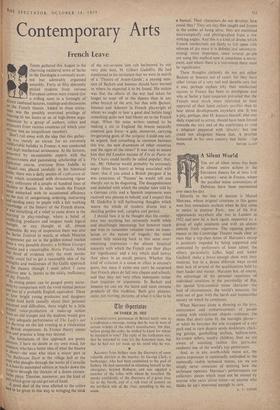A Silent World
THE art of silent. mime has been in almost entire eclipse in the European theatre for at least h ilf a century—save in France, where the peculiar mime conventions of Deburau have been maintained ever since his day.
Directly in the line of descent is Marcel Marceau, whose original cfeations in this genre won him immediate acclaim when he first came to notice in postwar Paris; one of his first appearances anywhere else was in London in 1952 and now he is back again, supported by a group of eight assistants and with an almost entirely fresh repertoire. The opening perfor- mance at the Cambridge Theatre made clear at once that a top-class mime of Marceau's stamp is positively impeded by being supported and contrasted by performers of lesser talent; the others, particularly Gilles. Segal and, Andre Gaillard, make a brave enough show with their material, but in a dozen different ways reveal their lack of several of the qualifications held by their leader and Master. Marceau has, of course, the advantage of his personal repertoire of individual creations in the personality of Bip, his special lyric-comical mime character—the butt of circumstance, the world's innocent, the man out of gear with the harsh and businesslike society on which he comments.
When Marceau alone is showing us the joys, annoyances and embarrassments of people coping with recalcitrant objects—suitcases, the shoes that don't quite fit, the too-tight gloves— or when he becomes the sole occupant of a city park and in turn depicts senile dodderers, clack- ing gossips, gambolling urchins, balloon-men, ice-cream sellers, sundry children, then we are aware of watching (within this particular medium) one of the world's top performers.
And, as in any worth-while mime act, the entire expression is continually embodied in the outwardly visible technical means, yet we are simply never conscious of noticing how the technique operates. Marceau's performances are collectors' pieces which must not be missed by anyone who cares 'about mime—or anyone who thinks he isn't interested enough to care.
A. V. COTON


































 Previous page
Previous page